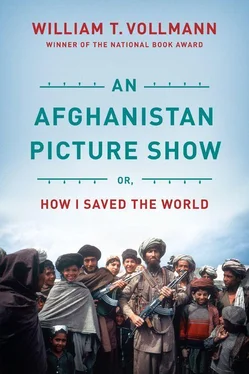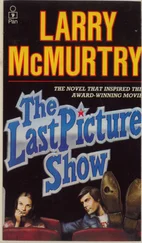STATEMENT OF REFUGEE IN CAMP (KOHAT)
“Why did you leave Afghanistan?”
“The Russians beat me up because I was not loyal to the Karmal regime,” said the man. “And I had not enough firearms — only one rifle for five, six males in the family, so we could not protect our womenfolk and children to be safe.”
“Are you happy here?”
“No, we are no happy.”
“Do you have any request to make of the Americans?”
“Tell them that we are very grateful for what the Americans are doing, and we say, God be with them.”
LOOKING BACK (1987)
Looking back, I am appalled at the unimaginativeness of my questions. I remember that I wanted to ask everyone the same things (“Are you happy here in the camps?” —“Why did you leave Afghanistan?” —“How could the United States best help you?”), because I was looking for some underlying structure or other to explain things. Then I could draw a blueprint showing where the refugee money came from, itemized down to the cent; I could draw elegant flow lines showing where it went: to a diamond entitled “RELIEF,”to a wide thin rectangle called “CORRUPTION”—and I could logically determine from this exactly how much was needed, and what was needed. (If ninety percent of the Afghans I asked said that they needed guns, I would try to send them guns. ‖) The next step would be to calculate how efficient the workings of the Mujahideen parties were, and which party was the best to support; from these and related computations I could begin the totaling of broader-based sums to discover who Afghans, Soviets, Pakistanis were … when all they were was people.
THE INTERVIEWS (1982)
To get the Overall Picture, you also talk to officials. Through a friend of the General’s who worked at the U.N. High Commission for Refugees, the Young Man arranged an interview with Marie Sardie, the U.N.H.C.R. nutritionist. — The Young Man she found slightly bewildering. — “Now, what is your purpose here?” she said at one point. “Is your purpose to increase aid for the refugees, or decrease aid for the refugees, or what?” —The Young Man replied that he wanted only to determine what exactly the refugees needed, and whether they were getting more or less than that. If they were getting less, then he would say in his presentation (which you are now reading) athat more should be sent. If they were getting more, then clearly he need not trouble himself with that problem. — This sort of fact-finding is essential to the draftsmen of arbitrary curves. — I for my part am probably even more irresponsible, since in my hesitation to draw arbitrary curves I forget that some curves are not arbitrary, that living, breathing life demands its due, which was hardly what it got when, for instance, I was picking apricots from a tree in Afghanistan with my friend Suleiman and found that I was standing on a human jaw with the flesh still on it, the flesh of a person killed by another person brought specially to kill him by people with their own great dues of state to pay; and I will never forget how blue the sky was. So let me pose a non-arbitrary question for the Young Man to ask Marie Sardie in her pleasant office in Peshawar: Are the Afghan refugees in the camps receiving enough nutrition to sustain life and to keep them — men, women, children — physically and mentally healthy? — Of course, replies the Young Man, if your seemingly straightforward question is broken down into its component atoms and particles, the arbitrariness of it comes to light; you see that, don’t you? That must be why your reflection is staring back at me so sadly from the darkness in the window. Yessir, Heisenberg was right, for consider: Whether or not the refugees receive enough, what proportion of what we give them goes to them, and what proportion is sold by Pakistanis in the stores at Saddar? How much of what gets to the camps is distributed fairly? — Surely such matters are subject to some ethical calculus, though what the axia of it are would be wretchedly difficult to say. — Is handing out rations year after year a satisfactory method of feeding people? If they don’t eat their own food, does something in them go unfed? — And how much from the rations is taken into Afghanistan with the Mujahideen? And is that fair? — Mujahideen are also refugees; many of them are registered at the camps, and they have as much of a right as any other refugees to the supplies provided — possibly more, since the idea of Afghans as refugees-in-perpetuity is repugnant to all of us who believe that the invasion was wrong, and the Mujahideen are at least trying to use those supplies to regain their homeland, and thus end their dependence on our subsidies. One has to respect them for that; and yet, is it right for the Mujahideen to eat U.N.I.C.E.F. tablets of condensed milk intended for their children? It seems to me right, but maybe it wouldn’t to U.N.I.C.E.F. — Round and round, round and round went such butterflies in the Young Man’s amoeba-ridden stomach; now these questions make me impatient, because, having resolved that the Afghans are in the right, and knowing that waste and corruption exist everywhere, I don’t care how many tons of supplies are diverted to uses other than feeding the refugees, as long as the refugees have enough; I cannot be bothered to wish that everything were perfect when all that I wish is that I never had to find that jaw beneath the apricot tree, with the flies on its one black lip; if I had the power, I would send them tons of food and missiles and tanks and airplanes and not worry about where they all went, because here the end justifies the means. It has to. And, so believing, I relinquish that aspect of innocence known as good faith, and my dreams are just a little stained; no doubt that is why the Young Man’s reflection is looking so sadly at me in the mirror. (Until he went to Afghanistan, he had scarcely even fired a gun!)
So the Young Man sat in Marie Sardie’s office, drinking her tea and asking somewhat hesitant and ill-informed questions, to which she gave entirely reasonable answers. She could not satisfy him, but then no one could, and, being unable to take that leap of faith which is really a fall, he was unable to help anyone.
STATEMENT OF MARIE SARDIE, U.N.H.C.R. NUTRITIONIST
“No one can say what their health is like subclinically,” she said, “but clinically it’s not too bad. The service they get is much better than the local, and it’s far, far better than what they get in Afghanistan. They’ve all got food and schooling and shelter and water supplies — some facilities, anyway — and the medical coverage is at least once a week. Now in Afghanistan they’d be lucky if they saw an orthodox doctor once in their lifetime … And this causes a lot of friction between the refugees and the locals. There’s no way the U.N.H.C.R. budget would be healthy enough to integrate the local facilities with our own program. But in some cases we’ve been trying to make the medical dispensaries available to the locals and the refugees. But the refugees don’t usually like that; and so many times the dispensary tends to be in the center of the camp.”
THINGS THAT PEOPLE WOULDN’T SAY ON TAPE [1]
Some Pakistanis didn’t actually like the refugees so much. Sometimes they wouldn’t even give them water.
STATEMENT OF MARIE SARDIE (continued)
The Young Man edged the tape recorder closer. — “Do you think that equity would dictate that these extras be cut back to the level of the local population?” he asked. He considered himself very precise.
Читать дальше












